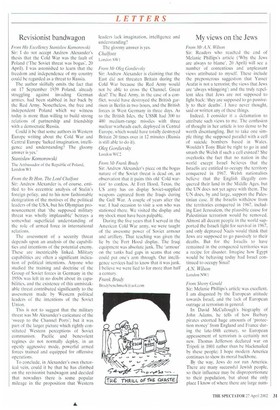Revisionist bandwagon
From His Excellency Stanislaw Komorowski Sir: I do not accept Andrew Alexander's thesis that the Cold War was the fault of Poland (`The Soviet threat was bogus', 20 April). I was astonished to learn that the freedom and independence of my country could be regarded as a threat to Russia.
The author skilfully omits the fact that on 17 September 1939 Poland, already struggling against invading German armies, had been stabbed in her back by the Red Army. Nonetheless, the free and independent Poland which we witness today is more than willing to build strong relations of partnership and friendship with a democratic Russia.
Could it be that some authors in Western Europe writing about the Cold War and Central Europe 'lacked imagination, intelligence and understanding? The gloomy answer is yes.'
Stanislaw Kornorowski
The Ambassador of the Republic of Poland, London WI
From the Rt Hon. The Lord Chalfont Sir: Andrew Alexander is. of course, entitled to his eccentric analysis of Stalin's foreign policy, and to his now fashionable denigration of the motives of the political leaders of the USA, but his Olympian pronouncement that 'the supposed military threat was wholly implausible' betrays a somewhat superficial understanding of the role of armed force in international relations.
The assessment of a security threat depends upon an analysis of the capabilities and intentions of the potential enemy. These are inextricably linked. Military capabilities are often a significant indication of political intentions. Anyone who studied the training and doctrine of the Group of Soviet forces in Germany in the 1950s was left in no doubt about its capabilities, and the existence of this unmistakable threat contributed significantly to the assessment made by Western political leaders of the intentions of the Soviet Union.
This is not to suggest that the military threat was Mr Alexander's caricature of the 'sweep to the Channel Ports'; but it was part of the larger picture which rightly constituted Western perceptions of Soviet communism. Pacific and benevolent regimes do not normally deploy, in an openly aggressive mode, powerful armed forces trained and equipped for offensive operations.
To conclude, in Alexander's own rhetorical vein, could it be that he has climbed on the revisionist bandwagon and decided that nowadays there is some popular mileage in the proposition that Western leaders lack imagination, intelligence and understanding?
The gloomy answer is yes.
Chalfont
Lon don SW1
From Mr Oleg Gordievsky Sir: Andrew Alexander is claiming that the East did not threaten Britain during the Cold War because the Red Army would not be able to cross the Channel. Great deal! The Red Army, in the case of a conflict, would have destroyed the British garrison in Berlin in two hours, and the British forces in West Germany in three days. As to the British Isles, the USSR had 300 to 400 medium-range missiles with three nuclear warheads each, deployed in Central Europe, which would have totally destroyed Britain 20 times over in 12 minutes (Russia is still able to do it).
Oleg Gordievsky
London WC2
From Mr Frank Brady
Sir: Andrew Alexander's piece on the bogus nature of the Soviet threat is dead on, an observation that it pains this old 'Cold warrior' to confess. At Fort Hood, Texas, the US army has on display Soviet-supplied weapons captured from the Iraqis during the Gulf War. A couple of years after the war. I had occasion to visit a son who was stationed there. We visited the display and my shock must have been palpable.
During the five years that I served in the American Cold War army, we were taught of the awesome power of Soviet armour and artillery. That teaching was given the lie by the Fort Hood display. The Iraqi equipment was absolute junk. The 'armour' on the tanks had gaps in seams that one could put one's arm through. Our intelligence services had to know that it was junk. I believe we were lied to for more than half a century.
Frank Brady
Bradybenchmark@aol.com


































































 Previous page
Previous page